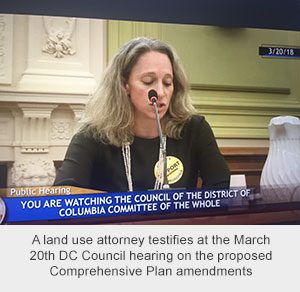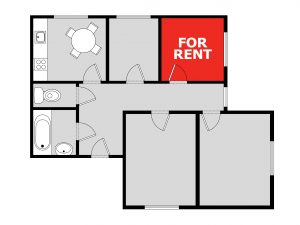
On the night of March 20th, 2018, I unwittingly walked into hostile territory – the DC Council chamber during the epic 13-hour public hearing on the proposed amendments to the Framework Element of the District’s Comprehensive Plan.
Perhaps the Washington Post headline said it best: “Dry DC Planning Document Fuels Hot Debate”.
While I was joined by many leaders of the development community, as highlighted in the Bisnow article dated March 20th, I think that all of us were surprised at the angry tenor of the opposition to the amendments. Guy Durant, of the Durant case fame, went so far as to call us “devil-opers” with the emphasis on the “devil”. And there were no punches pulled on the members of the land use bar who were called all sorts of names, none of which were nice.
The opposition used the hearing as an opportunity to air their dirty laundry on any and all issues relating (even tangentially) to land use and development. Their concerns ranged from displacement of residents to DC Water fees. They clearly wanted a soap box and found it. Read more ›

 Thanks to the recent development boom, the District certainly has become hip. It follows suit that many multi-family, condo and mixed-use developers are looking in the District for good buys to develop or to hold.
Thanks to the recent development boom, the District certainly has become hip. It follows suit that many multi-family, condo and mixed-use developers are looking in the District for good buys to develop or to hold. Community housing, boarding houses, and communal living arrangements have been around since the 1840s, as indicated by a brochure by the Academy of American Poets when it identified the boarding houses where Walt Whitman and Edgar Allen Poe
Community housing, boarding houses, and communal living arrangements have been around since the 1840s, as indicated by a brochure by the Academy of American Poets when it identified the boarding houses where Walt Whitman and Edgar Allen Poe  Protecting one’s property is an innate impulse that dates back to the beginnings of man. The cavemen defended their caves with clubs and rocks. It remains unclear whether cavemen also went to community meetings and objected to an increase in density at the neighboring cave. The question is: how similar is an Advisory Neighborhood Commission (“ANC”) meeting or Party Status in Opposition in the District to the Caveman’s Club?
Protecting one’s property is an innate impulse that dates back to the beginnings of man. The cavemen defended their caves with clubs and rocks. It remains unclear whether cavemen also went to community meetings and objected to an increase in density at the neighboring cave. The question is: how similar is an Advisory Neighborhood Commission (“ANC”) meeting or Party Status in Opposition in the District to the Caveman’s Club?